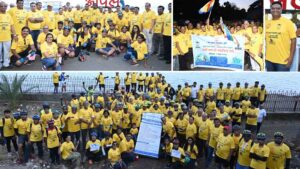Examining the Intense Study Timetables of JEE Aspirants

PIC For Representational Purpose Only
As students gear up for the second session of the Joint Entrance Examination (JEE) Main, considered one of the toughest exams in the country, a viral post has ignited discussions about the intense study schedules followed by aspirants. The post, shared on X, showcases the timetable of a JEE aspirant, revealing a grueling routine involving nearly 17 hours of study per day, leaving minimal time for sleep and breaks.
The post has sparked questions about the effectiveness and sustainability of such rigorous study patterns. While some believe in the necessity of long hours of study to crack the exam, others express concerns about the toll it may take on students’ well-being and long-term success.
🚨 A 17-year-old student schedules for India's toughest exam, IIT-JEE preparation. (📸-@rcx86) pic.twitter.com/DG2vbTWR27
— Indian Tech & Infra (@IndianTechGuide) March 21, 2024
Insights from Aspirants
One of the JEE aspirant from East Kidwai Nagar, shares his rigorous study routine, involving over 12 hours of self-study daily. He took a gap year to focus solely on exam preparation, attending coaching classes six days a week before the first session of JEE Main. Now, he dedicates specific hours throughout the day to studying, starting from early morning until late evening.
However, not all aspirants find such demanding schedules sustainable. Another aspirant, recently done with her board exams, emphasizes the importance of balancing study with socializing and downtime to avoid burnout.
Perspectives from Alumni
An IIT Delhi alum from the batch of 2019, stresses the importance of efficient studying over sheer hours spent. He advocates for flexible study plans tailored to individual needs, rather than rigid schedules.
A senior software engineer and IIT Delhi graduate, reflects on his own study experience, highlighting the need for relaxation amidst intense competition.
Expert Advice
A clinical psychologist , warns against extreme study schedules, emphasizing the importance of adequate rest for young minds. She cautions that insufficient sleep can hinder information retention and lead to a cycle of stress and forgetfulness.
The debate continues as students, alumni, and experts weigh in on the optimal approach to exam preparation amidst the pressure of high-stakes exams.









